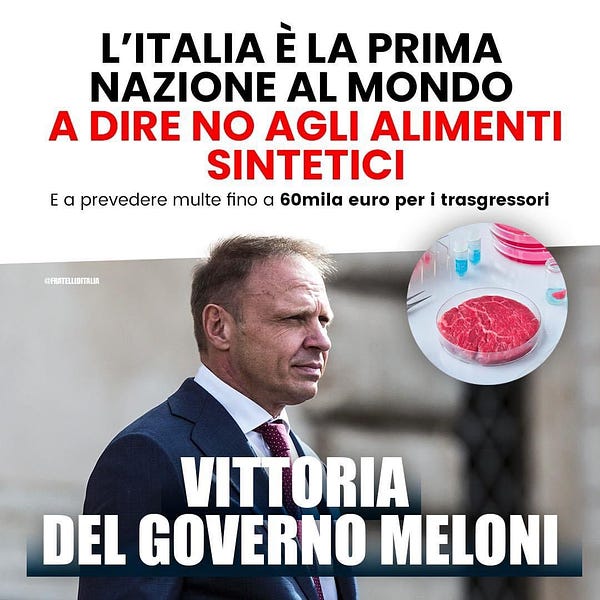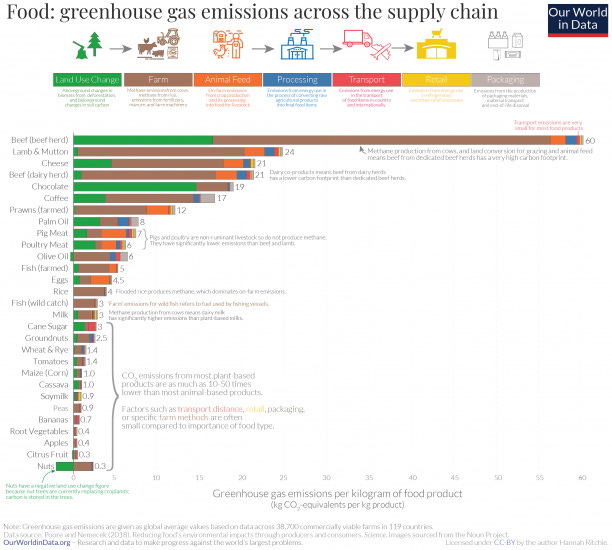🌱 Longevity Secrets 🧀 Chickpea Cheese 🧫 Italy's Cell-Based Ban?
Plantwise Monthly Roundup (March 2023)
📖 About us: We are a UK startup that helps people enjoy a healthy plant-based lifestyle while saving money. Ranked in the top App Store charts across Europe, the Plantwise meal-planning app 🔗📲 offers protein-rich recipes that are both tasty and affordable.
👀 In this monthly roundup, we review March’s most interesting plant-based studies, product launches, and government policy changes. Make sure to check out our Quick Fire Questions on protein, calcium, and iron.
🩺 A Healthy Plant-Based Diet Linked to Lower Mortality Risk
📚 TL;DR: According to a recent study of 126,394 UK adults, adhering to a healthy plant-based diet can reduce the risk of mortality and chronic disease. The study followed participants for up to 12 years and found that plant-based diets low in animal foods, sugary drinks, snacks, desserts, refined grains, potatoes, and fruit juices were associated with lower risks of mortality overall and from cancer and cardiovascular disease. This finding is independent of established chronic disease risk factors and genetic predisposition.
💡Insights: It's important to note that not all plant-based diets are equal. Adhering to an unhealthy plant-based diet (i.e., regular consumption of the aforementioned foods) could result in a higher risk of mortality, cancer, and cardiovascular disease. Therefore, it's important to choose a healthy plant-based diet that is rich in nutrients and low in processed foods.
➡️ You could read the full study here.
🙋♀️ Quick Fire Plant-based Questions
Q: Is it possible to get enough protein on a plant-based diet?
A: Absolutely! Every plant-based food contains protein, and many athletes, including Lewis Hamilton, Serena Williams, and Novak Djokovic, meet their protein requirements through a plant-based diet. There are plenty of protein-rich plant-based sources, such as legumes (e.g., lentils, chickpeas, and beans), nuts and seeds (e.g., almonds, chia seeds, and pumpkin seeds), whole grains (e.g., quinoa, brown rice, and oats), and soy products (e.g., tofu, tempeh, and edamame).
Q: Can I get enough calcium on a plant-based diet?
A: Yes, there are many plant-based sources of calcium that can provide all the calcium that the body needs. Some of these calcium-rich foods include dark leafy greens (e.g., kale, collard greens, and pak-choi), tofu, fortified plant-based milks, nuts and seeds (e.g., almonds, sesame seeds, and chia seeds), and legumes (e.g. chickpeas, black beans, and lentils).
Q: Can I get enough iron on a plant-based diet?
A: Yes, it's definitely possible to get enough iron on a plant-based diet by consuming a variety of iron-rich plant-based foods. To help the body absorb non-heme iron more efficiently, it's also important to consume foods that are rich in vitamin C, such as citrus fruits, tomatoes, and bell peppers, at the same time as iron-rich plant-based foods. Avoid consuming tea or coffee with meals as they can hinder iron absorption. Plant-based sources of iron include legumes, tofu, dark leafy greens, whole grains, nuts, and seeds.
➡️ You could find the best plant-based options for specific nutrients on the Plantwise app here.
🧀 Is Chickpea-Based Cheese the Game-Changer for Plant-Based Dairy Alternatives?

📚 TL;DR: ChickP Protein, a food tech start-up based in Israel, has created chickpea-based cream cheese and firm cheddar cheese prototypes that offer the same appearance, flavour, and nutritional value as dairy cheese. With these innovations, manufacturers can now create plant-based cheese products that provide an authentic cheese experience. ChickP's cheese-making process uses traditional fermentation techniques that create probiotic-rich, tangy cream cheese and meltable cheddar without stabilisers or gums. The company's chickpea isolate has a 90% whole protein composition and a neutral flavour, making it versatile for various applications. ChickP is also currently developing other popular cheese analogues, including Emmental, parmesan, and mozzarella.
🧩 Context: The plant-based cheese market is growing rapidly, and consumers are increasingly seeking vegan options that match real dairy in sensory and nutritional attributes. A recent survey across 10 European countries reveals a strong desire for plant-based cheese, but dissatisfaction with taste, texture, and price has hindered this transition. As such, the industry is working to close these gaps and offer more authentic and nutritious plant-based cheese options. ChickP's innovations in chickpea-based cheese production offer a promising solution to the challenges facing the plant-based cheese market.
➡️ You can read more about ChickP’s company story here.
🧈 Naturli' Foods Aims to Disrupt US Vegan Butter Scene
📚 TL;DR: Denmark-based Naturli' Foods is set to enter the US market with its plant-based butter alternative again, beginning with Texas retailer H-E-B in June. The move comes as CEO Henrik Lund sees potential in the US vegan dairy market, following recent issues at market leader Miyoko's Creamery. As more consumers turn to plant-based diets, Naturli believes that the demand for high-quality and delicious dairy alternatives will continue to grow.
🧩 Context: Naturli' Foods has shifted its focus from plant-based meat to dairy spreads and ice cream, anticipating consolidation in the plant-based meat market in the coming years. By concentrating on the more complex and expensive dairy sector, Naturli' Foods aims to disrupt the US vegan butter scene with its innovative plant-based alternative. Naturli' Foods products are already available in the UK through major retailers like Sainsbury's and Waitrose.
➡️ Naturli’s Vegan Spread (450g) is currently on sale in Sainsbury’s for £3.35.
🗳️ Oxford City Council votes to ban animal products from internal events and promote plant-based produce
📚 TL;DR: The Oxford City Council has made the decision to ban animal products from its internal events and pledged to support community groups in creating plant-based free food services. This vote is a positive step towards promoting plant-based living and a more sustainable food system. While farmers and butchers heavily criticised the decision, calling it a "kneejerk reaction" that could cost many jobs, the move could inspire other communities and organisations to follow suit.
🧩 Insights: The Oxford City Council's decision follows a global trend of cities and governments promoting plant-based diets for health and environmental reasons. As illustrated by the chart shared by Our World In Data, cutting back on meat can substantially reduce the impact on the environment. At the same time, it's also crucial to support local livestock farmers in transitioning from animal agriculture through collaborative government and consumer support. By working together, we can create a more sustainable food system that benefits both the environment and our local communities.
➡️ You can read the coverage from both sides on Vegan Food and Living and Daily Mail.
🧫 Italy May Ban Lab-Grown Food, Defying Global Trend
📚 TL;DR: Italy's government has backed a bill banning the production of cell-based food and animal feed in a move to protect the country's food traditions. The bill, which still requires ratification by parliament, imposes fines of up to €60,000 for violations. Pressure from the agri-food industry, such as Coldiretti (Italy's biggest farmers' association), has played a role in the government's decision to protect local produce and promote the 'Made in Italy' brand. In a tweet, Italy's Minister of Agriculture described the decision as "A battle of civilizations. In defence of citizens' health, of our production model, of our quality, of our culture, simply our FOOD SOVEREIGNTY"


💡 Insights: The ban could prevent Italian scientists from conducting essential research and disallow cultivated meat startups in the country. Alice Ravenscroft, head of policy at the Good Food Institute Europe, highlights Italy as an outlier compared to other European countries investing in cell-based food research, noting that other governments are eager to unlock the benefits of cultivated meat. This decision goes against global trends, with other countries like the US and Singapore approving cell-based meat products.
➡️ We have written a quick(ish) explainer on cell-based meat here.
Popular Articles on Plantwise Substack
🍿Oatly Launches "No" Sugars Oat Drink & Commercial Strategy For 2023 - Oatly's latest launch flies under the radar, but shows a focus on doubling down on its mission and pivoting from things that didn't work.
🍽️ Let's Eat Out: Plant-based Menus In London (March 2023) - Restaurant Highlights featuring Galvin La Chapelle, Tofu Vegan, and The Vurger Co.
🥩 Cultivated Meat - What You Need To Know - A quick(ish) explainer including the culture process, its advantages, and the key challenges
🖋️ Get in touch
If there is a specific piece of news, topic, or brand that interests you, please share it with us!
Email: hello@plantwiseapp.com
Twitter: https://twitter.com/PlantwiseTweets



